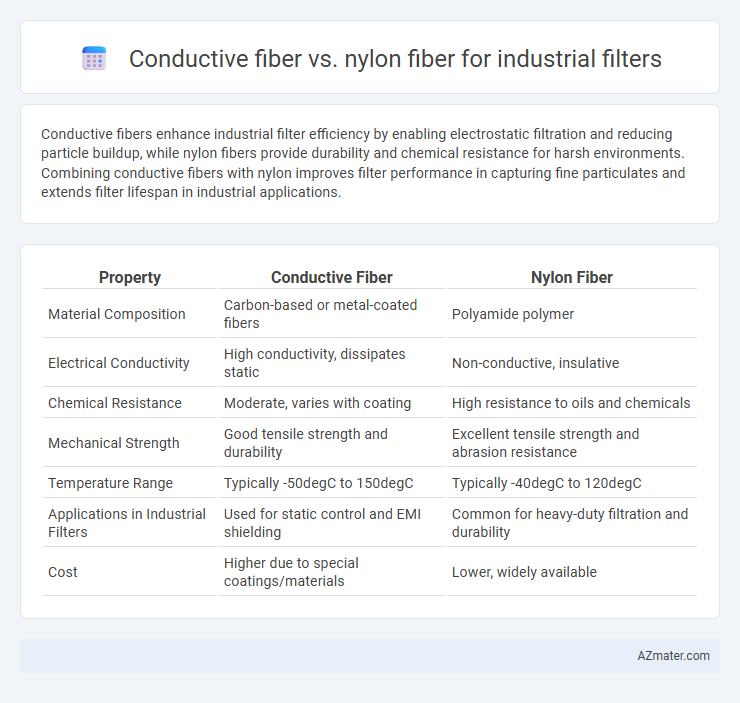Conductive fibers enhance industrial filter efficiency by enabling electrostatic filtration and reducing particle buildup, while nylon fibers provide durability and chemical resistance for harsh environments. Combining conductive fibers with nylon improves filter performance in capturing fine particulates and extends filter lifespan in industrial applications.
Table of Comparison
| Property | Conductive Fiber | Nylon Fiber |
|---|---|---|
| Material Composition | Carbon-based or metal-coated fibers | Polyamide polymer |
| Electrical Conductivity | High conductivity, dissipates static | Non-conductive, insulative |
| Chemical Resistance | Moderate, varies with coating | High resistance to oils and chemicals |
| Mechanical Strength | Good tensile strength and durability | Excellent tensile strength and abrasion resistance |
| Temperature Range | Typically -50degC to 150degC | Typically -40degC to 120degC |
| Applications in Industrial Filters | Used for static control and EMI shielding | Common for heavy-duty filtration and durability |
| Cost | Higher due to special coatings/materials | Lower, widely available |
Overview of Industrial Filter Materials
Conductive fibers and nylon fibers serve distinct roles in industrial filter materials, with conductive fibers offering superior electrostatic dissipation essential in dust collection and hazardous environments. Nylon fibers provide excellent chemical resistance, durability, and flexibility, making them suitable for filtration in harsh chemical or abrasive industrial processes. The choice between conductive and nylon fibers depends on specific operational requirements such as static charge management, chemical exposure, and mechanical strength.
Introduction to Conductive Fiber
Conductive fibers, typically composed of carbon or metal-coated polymers, offer superior electrical conductivity compared to traditional nylon fibers, making them essential in industrial filter applications requiring static dissipation and enhanced durability. These fibers prevent particle accumulation and minimize filter clogging by effectively grounding electrostatic charges, which nylon fibers lack due to their insulating properties. Industrial filters utilizing conductive fibers ensure improved process efficiency and longer service life in environments prone to explosive dust or high static buildup.
Introduction to Nylon Fiber
Nylon fiber is a synthetic polymer widely used in industrial filters due to its excellent tensile strength, chemical resistance, and durability under harsh operating conditions. Unlike conductive fibers that require electrical conductivity for specific filtration applications, nylon fibers provide a non-conductive, cost-effective solution with high abrasion resistance and moisture absorption capabilities. These properties make nylon fibers ideal for filtering dust, liquids, and particulates in chemical, food processing, and pharmaceutical industries.
Key Performance Characteristics
Conductive fibers offer superior electrostatic dissipation and enhanced filtration efficiency in industrial filters compared to nylon fibers, which primarily provide mechanical strength and chemical resistance. Conductive fibers improve particle capture by preventing static build-up, crucial for applications involving fine dust or hazardous particles, whereas nylon fibers excel in durability and resistance to abrasion and chemicals. Choosing between conductive and nylon fibers depends on the specific industrial filtration needs, balancing conductivity, filtration efficiency, mechanical strength, and environmental resistance.
Filtration Efficiency Comparison
Conductive fibers enhance industrial filter performance by reducing static charge buildup, promoting consistent particle capture and improving filtration efficiency compared to nylon fibers. Nylon fibers provide durability and chemical resistance but lack the inherent conductive properties crucial for filtering fine particulate matter in electrostatically sensitive environments. Filters incorporating conductive fibers achieve higher filtration efficiency, especially in applications requiring effective removal of submicron particles and prevention of filter clogging.
Electrostatic Properties and Applications
Conductive fibers, composed of materials like carbon or metal-coated polymers, offer superior electrostatic dissipation compared to nylon fibers, making them ideal for industrial filters where static charge buildup can cause particle attraction and filter clogging. Nylon fibers exhibit limited electrostatic conductivity but provide excellent mechanical strength and chemical resistance, suitable for filtration in environments with less concern for static charge. Industrial applications of conductive fibers include pharmaceutical, electronics manufacturing, and explosive handling industries, whereas nylon fibers find frequent use in chemical processing, water treatment, and general dust collection systems.
Chemical and Thermal Resistance
Conductive fibers used in industrial filters typically offer superior chemical resistance, effectively withstanding exposure to aggressive solvents, acids, and alkalis commonly found in industrial environments, compared to nylon fibers which may degrade or lose integrity under similar conditions. Thermal resistance in conductive fibers often exceeds that of nylon fibers, with some conductive materials tolerating temperatures above 200degC, whereas nylon fibers generally withstand continuous use only up to about 120degC before melting or weakening. These properties make conductive fibers more suitable for high-temperature, chemically aggressive filtration applications where durability and long-term performance are critical.
Durability and Lifespan
Conductive fibers in industrial filters offer superior durability due to their enhanced resistance to abrasion, chemical corrosion, and high temperatures compared to traditional nylon fibers. Nylon fibers, while flexible and cost-effective, tend to degrade faster under harsh industrial conditions, leading to a shorter lifespan and more frequent replacements. The extended lifespan of conductive fiber filters reduces downtime and maintenance costs, making them a more reliable choice for demanding filtration applications.
Cost Analysis and Economic Impact
Conductive fiber offers superior performance in industrial filters by efficiently dissipating static charge, which reduces equipment downtime and maintenance costs compared to nylon fiber. Although conductive fibers typically have a higher initial purchase price, their enhanced durability and improved filtration efficiency lead to lower total lifecycle costs and higher return on investment. In contrast, nylon fiber filters may incur additional expenses due to frequent replacements, potential static-related failures, and less effective filtration, impacting overall economic feasibility in industrial applications.
Best Use Cases: Conductive vs Nylon Fiber
Conductive fibers excel in industrial filters requiring static dissipation and electrical conductivity, making them ideal for applications in electronics manufacturing and chemical processing where spark prevention is critical. Nylon fibers offer superior mechanical strength, chemical resistance, and flexibility, suited for high-durability filters in water treatment, food processing, and heavy particulate filtration. Selecting between conductive and nylon fiber filters depends on the need for anti-static properties versus robustness and chemical stability.

Infographic: Conductive fiber vs Nylon fiber for Industrial filter
 azmater.com
azmater.com